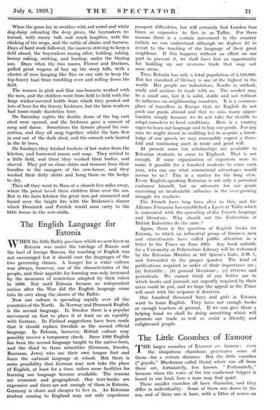The English Language for Estonia
WHEN the little Baltic province which we now know as Estonia was under the tutelage of Russia and the heel of foreign Barons, the teaching of English was not encouraged lest it should oust the languages of the two governing classes. A hunger for a wider culture was always, however, one of the characteristics of the people, and their appetite for learning was only increased by the measures of restriction adopted by their rulers in 1890. Not until Estonia became an independent nation after the War did the English language come into its own along the shores of the Baltic.
Now our culture is spreading rapidly over all the countries of the North. In Norway and Denmark English is the second language. In Sweden there is a popular movement on foot to place it at least on an equality with German. In Finland suggestions have been made that it should replace Swedish as the second official language. In Estonia, however, British culture may possibly receive a temporary check. Since 1920 English has been the second language taught to the native-born, and the third to those minorities (Germans, Swedes, Russians, Jews) who use their own tongue first and learn the national language at school. But there is some possibility that German may now take the place of English, at least for a time, unless more facilities for learning our language become available. The reasons are economic and geographical. Our text-books are expensive and there are not enough of them in Estonia. Germany is closer and cheaper to live in. An Estonian student coming to England may not only experience passport difficulties, but will certainly find London four times as expensive to live in as Tallin. For these reasons there is a certain movement in the country (which we can understand although we deplore it) to revert to the teaching of the language of their great neighbour. If this happens without an effort on our part to prevent it, we shall have lost an opportunity for building up our overseas trade that may not soon recur.
True, Estonia has only a total population of 1,100,000. But her standard of literacy is one of the highest in the world. Her people are industrious, Nordic in outlook, ready and anxious to trade with us. The market may be a small one, but it is solid, stable and not without its influence on neighbouring countries. It is a common- place of travellers in Europe that we English do not push our goods abroad and that we miss many oppor- tunities simply because we do not take the trouble to adapt ourselves to local conditions. Here is a country eager to learn our language and to buy our goods. For any sum we might invest in enabling her to acquire a know- ledge of our speech we may reasonably expect a three- fold and continuing asset in trade and good will.
At present some ten scholarships are available to Estonian students to come to England. That is not enough. If some organization of exporters were to make it possible for a hundred students to come each year, who can say what commercial advantages would accrue to us ? This is a matter for the long view. Every English-speaking Estonian is not only a potential customer himself, but an advocate for our goods exercising an incalculable influence in the ever-growing struggle for markets.
The French have long been alive to this, and the Alliance Francs:rise has established a Lye& at Tallin which is concerned with the spreading of the French language and literature. Why should not the Federation of British Industries do the same ?
Again, there is the question of English books for Estonia, to which an influential group of business men and educationists have called public attention in a letter to the Times on June 20th. Any book suitable for a University or Polytechnic Library will be welcomed by the Estonian Minister at 167 Queen's Gate, S.W. 7, and forwarded to the proper quarter. The kind of publications required in order of their importance are : (a) Scientific ; (b) general literature ; (c) reviews and periodicals. We cannot think of any better use to which books and journals not urgently required by their users could be put, and we hope the appeal in the Times will meet with the response it deserves.
One hundred thousand boys and girls in Estonia want to learn English. They have not enough books or enough teachers at present. If we can give them a helping hand we shall be doing something which will promote our trade as well as assist a friendly and enlightened people.










































 Previous page
Previous page